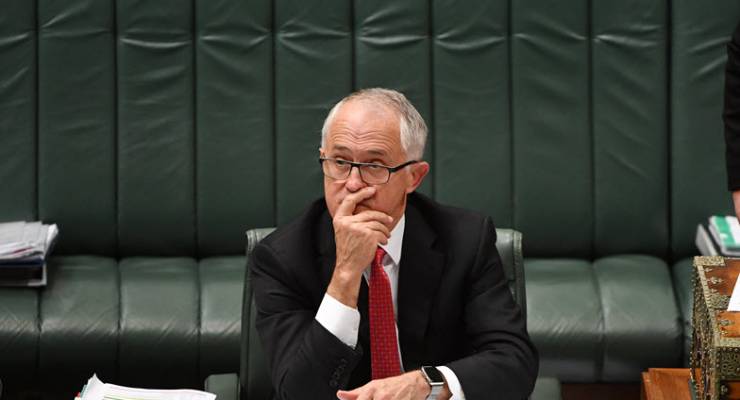
There’s a storm brewing for Malcolm Turnbull that may erupt on a number of fronts in the next week or two. When the tempest hits, it will be due to the prime minister’s increasingly bold moves to shift the government closer to the political centre.
Given these moves involve shifting the Coalition’s administration to the left, it’s causing considerable angst for conservative warriors — both outside and inside the government.
First there was this year’s federal budget, which seems to have the whiff of socialism for anyone who dresses to the right of the political spectrum. These conservative stalwarts were reportedly prepared to hold their noses on the condition that the treasonous budget delivered dividends in the opinion polls.
Tony Abbott initially toed the line, after failing to instigate a party room revolt over the Gonski 2.0 reforms. Abbott told his tabloid radio fans the budget was the best the government could do in the circumstances, given the Senate’s unwillingness to pass a “savings budget” like the one he tried to implement in 2014.
However Turnbull’s uneasy truce with conservative MPs was shattered when Pauline Hanson unsuccessfully tried to get the head of the Australian Security Intelligence Organisation to confirm there was a connection between refugees and terrorism.
Conservatives were already cranky the PM had seemingly avoided giving an Abbott-like rant against Islamism in the days following the Sydney siege inquest and the terrorist attack in Manchester. The concomitant refusal by Australia’s chief spook to tar all refugees with the terrorist brush sent them into apoplexy.
Following the latest terrorist attack in London on the weekend, the conservative right will be bristling with righteous vindication and wishing they’d been the first to think of the appalling meme posted by Pauline Hanson on social media.
They’ll also be ramping up pressure on Turnbull to “open up” a conversation on the connection between Islam and terrorism and take a more forceful position on the issue.
Against the background of a dead-cat budget that the conservatives hate and their heightened calls for Turnbull to man-up on Islam, the PM will reportedly provide his detractors with yet another line of attack this week.
Tactical leaks and background briefings to the media have been preparing the ground for the government to respond to the Finkel review due to be released at the end of this week with a proposal to adopt a technology-agnostic low emissions target to strengthen the security of Australia’s electricity supply.
The low emissions target is Plan B after an earlier proposal to adopt an Emissions Intensity Scheme (EIS) was dropped almost as soon as it was raised. This was due to Liberal conservatives protesting that an EIS was the same as a carbon tax. They argued the Coalition needed to be able to use Labor’s support for carbon pricing as a key point of differentiation, given electricity prices are a deciding factor for voters on low and middle incomes.
Finkel’s low emissions target is meant to mollify the Coalition’s hard right, because it will be open to low emissions technologies that use coal. It remains to be seen whether a new low-emissions coal-fired plant or the retrofitting of old plants with carbon capture and storage will stack up, even with a government subsidy.
Even so, adoption of a low emissions target will likely be depicted by the government’s far right MPs as muddying the clean line of distinction between the Coalition and Labor. Their preferred path for coal is for Turnbull to follow Trump and withdraw from the Paris treaty.
By holding fast to this increasingly progressive approach, Turnbull is starting to deliver the centrist government many voters expected of him. But in doing so the PM will also incite a perfect storm of resistance from the conservative insurgents within his own party.








I understand the writer is a centralist conservative and writes reasoned articles, in fact more balanced that some of the political writers ate Fairfax and The Guardian, but to describe Turnbull as having a progressive approach is drawing a long bow.
It was a change in Turnbull’s determination for moderation that cause any lessening of reactionary rhetoric or neo liberal policies but the abject fear that the noose is drawing tighter. He rolled Abbott,on his own admission, on the basis of poll results. Those same polls are showing a relentless determination that we do not like Turnbull or his policies.
As a result of those polls has had no other choice but to change direction, the difficulty is that most people don’t believe him. He is being judged on 25+years of being in public view and we have seen such remarkable swings in his core “beliefs” that many people have concluded he has, in fact, no core beliefs other than his own superiority.
The conservatives in the L/NP worked Turnbull out way before any professional commentators did.
Exactly. Turnbull is doing too little too late.
A very long bow, indeed. Turnbull certainly is an “ist”, but it’s an opportunist, not a centrist.
And why has the electorate noticeably shifted to the left? Because the middle class are increasingly missing out and a lot of very grey haired people are slowly realising things aren’t too rosy for their adult grandchildren after all. Who knew?
Turnbull would be wise to ignore the rants and hysteria of the extreme right nutters of the LNP … they have a limited appeal in Australia aside from a minority of rusted on fans of barking mad propagandists like Hadley or Bolt
But… so what? The media (including Crikey) seems obsessed with trying to convince us that those to Turnbull’s right will bring down the government rather than accept centrist policies.
I know conflict promotes clicks, but I call bullshit. Why would they? The right-wingers are careerist politicians just like the rest of them; the only way they get the goodies is by being in power. Turnbull should go ahead and defy them all he likes, knowing the public is on his side. In fact he should have been doing this from Day One.
I was one who lauded the change to Turnbull. I’m not of the right, but I thought at least here’s a worldly, well spoken, middle of the road politician who won’t embarrass us on the world stage. How disappointed I was then to find his government pursued the same distasteful out-of-touch policies as Abbott’s. I think the current changes are seen as pure populism by an even more cynical public. Barring a major implosion, the next election is forgone conclusion…
” a proposal to adopt a technology-agnostic low emissions target”
Unfortunately there are no fossil fuel low emission technologies, and vast amounts of no emission renewables. Oh well, back to the drawing board.
Couldn’t happen to a nicer group of dimwits